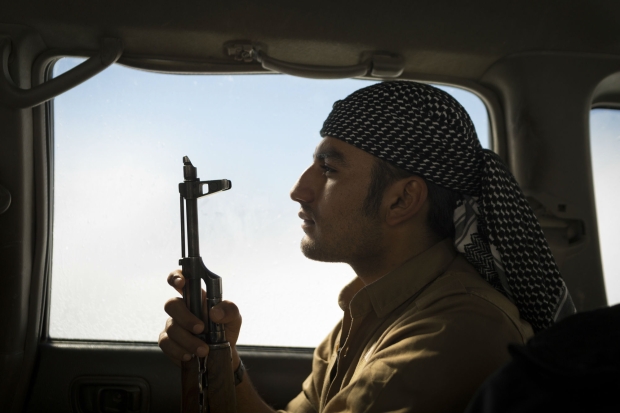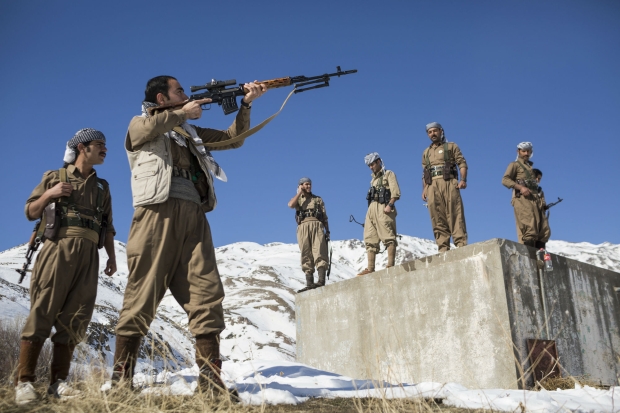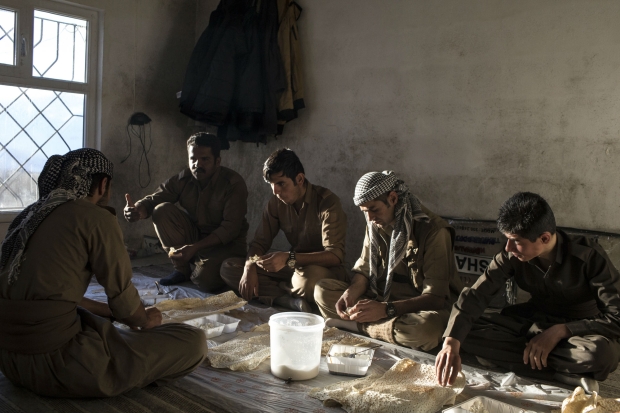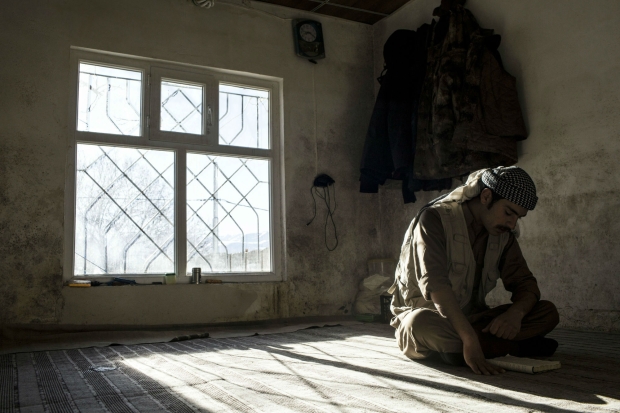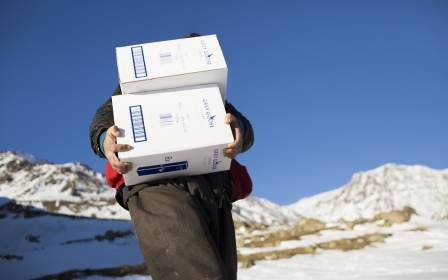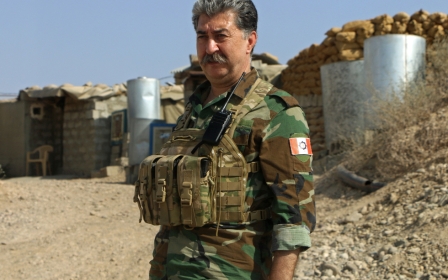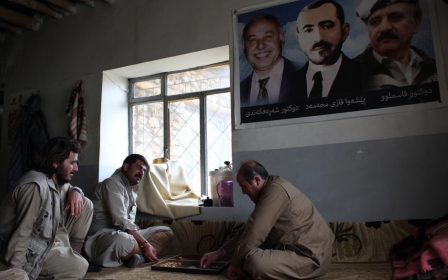Iranian Kurds march to war: 'We don't care how strong the enemy is'
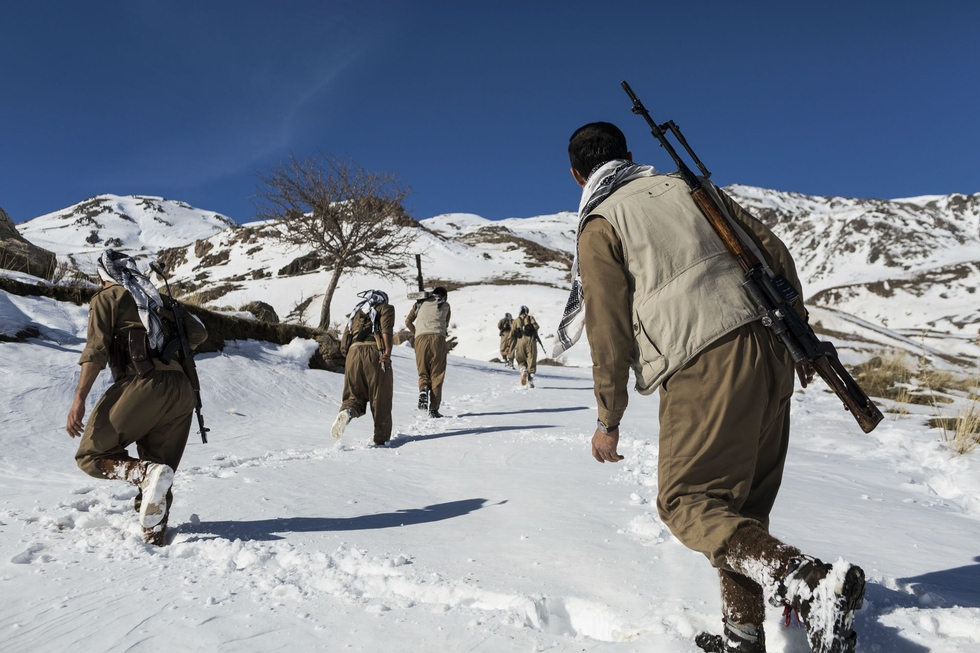
HAJI OMRAN, Iraq - The recruits huddle together inside their secret barracks deep in the Zagros mountains, as commander Rahim Manguri reminds them of why they are here: "This base is a military target," he warns. "If you decide to stay, it is your responsibility."
The platoon of about 20 fighters are stationed here, 5km from the Iranian border, to learn the ways of the PDKI, or Democratic Party of Iranian Kurdistan, and its battle against the Iranian government. In the morning they receive political education. In the afternoon, they train for war.
And with winter now gone, they are preparing to put that training into practice, fighting not for total independence, but federal autonomy within Iran.
"Early in the morning we study different philosophers and world political leaders. After that we do physical training and military exercises. It is important be well prepared to fight," says Jamal Bornasar, PDKI member, before leaving the barrack.
"We have resumed the armed struggle because we are sure that the Iranian regime will never take our aspirations into account. We must put pressure on the Tehran government and the best way to do that is by returning to arms," says Manguri, who joined the party at the age of 14, speaking to the group of 20 young fighters, all sitting around a wood-burning stove.
This Kurdish paramilitary unit meeting takes place in a small house converted into a military barracks. Well hidden and flanked by the 3,000m-high peaks of the Zagros Mountains, this Hadaka – as it is known in Kurdish – base is only 5km away from the Iranian border.
Refusing to sit idly by
Manguri, the 52-year-old commander, was born in the Iranian Kurdish town of Piranshahr, and joined the PDKI in 1979 as a political activist, three years later becoming a Peshmerga fighter. "I did it because of the Iranian regime repression against our people. I could not sit idly by."
The leftist PDKI was founded in 1945 to defend Iranian Kurds' right to self-determination, and in 1946 played an important role in the creation of the short-lived Republic of Mahabad, the only moment in history in which Kurds have had something resembling a state. The republic proclaimed in the western Iranian city was overturned a year later, after which PDKI almost disappeared.
But the Kurdish party survived and took part in the 1979 Iranian revolution that toppled the Shah. However, Ayatollah Ruhollah Khomeini refused Kurdish demands, banned Kurdish political parties and forced the PDKI into exile in Iraqi Kurdistan.
"The Kurdish nation has been oppressed for many years by the Shah of Persia and the ayatollah's regime. That's why we are so poor," says Bornasar, warming his hands over the stove.
'We do not want an independent Kurdistan because economically and politically it is very complicated'
- Jamal Bornasar, PDKI member
However, the PDKI member stresses that they are not fighting for a sovereign state.
"We do not want an independent Kurdistan because economically and politically it is very complicated. We are committed to a democratic and federal system in order to benefit from Iran's resources," says the 25-year-old, with his incipient moustache.
Born in Mahabad, Bornasar joined the party in 2011. "For five years I was involved in clandestine political activities inside Iran. But last summer I decided to go up to the mountains and become a Peshmerga because if I had stayed there I would have been arrested."
Like Bornasar, most of the unit's 20 fighters are new recruits. "For security reasons, we cannot say how many combatants we have. But since we resumed the armed struggle two years ago many young people have joined our ranks," commander Manguri says.
After almost two decades without armed activity, the Hadaka announced its return to arms after an incident in May 2015, when Farinaz Khosravani, a 25-year-old Kurdish woman, was allegedly raped by an officer of the Islamic Revolutionary Guard Corps.
When the chambermaid then committed suicide, her death sparked mass protests in the main Iranian Kurdish cities. Government authorities killed at least six protesters and dozens were arrested. The armed conflict was back on.
Resurgence in clashes
The young men stand in front of the base, clutching their AK-47s, ready to hike across the snowy mountains in the direction of Iran, a trek that will take several hours. "Let's go," the commander shouts.
Despite thick snow covering the road, the platoon begins to walk quickly, in a line, with several metres separating each member.
Sadi Muradpur, a 19-year-old from Piranshahr, in West Azerbaijan Province, made the reverse journey in the spring of 2016, when he fled Iran to join the PDKI militia.
"I came here, crossing the border illegally through the mountains. It was hard but it was worth it," Muradpur says.
"I was studying to go to university and I needed a job to pay for my studies. But all the doors were closed to Kurds," Muradpur says. "Such examples of ethnic discrimination like mine encourage many young people to take the step of becoming a Peshmerga."
Muradpur's grandfather was also a PDKI militiaman and died in the 1980s at the hands of the Iranian army. "In my house I've been hearing about the political and armed struggle since I was born. Before I came here I was part of a dormant and clandestine party cell in the city."
"Since we restarted the armed struggle in 2015, 30 Peshmerga have lost their lives in clashes with the Iranian Revolutionary Guard," Manguri says.
The PDKI is not alone. Komala - the Society of Revolutionary Toilers of Iranian Kurdistan - also announced its return to arms last April.
And in the last few weeks, after an announcement from the Kurdish militias that attacks against Iranian forces would soon be launched, clashes have taken place.
On 27 May, the Kurdistan Free Life Party (PJAK), an armed group in Iran, affiliated with the outlawed PKK, the Kurdistan Workers' Party, in Turkey, killed two border guards and wounded seven in clashes near the Iranian Kurdish city of Urmia.
"I am not afraid to go to the frontline because we have grown up in a society where we have always heard Peshmerga stories of heroism and resistance," says Bornasar, while resting in a concrete structure on the mountainside.
"We are prepared to fight and I do not care how strong the enemy is," he adds, defiantly.
'I am not afraid to go to the frontline because we have grown up in a society where we have always heard Peshmerga stories of heroism and resistance'
- Jamal Bornasar, PDKI member
As a game, the Kurdish fighters start looking through the Dragunov sniper rifle's scope and some of them shoot against a big rock situated a couple of hundred metres away.
"We do not expect the Trump administration to provide us with weapons or economic aid, but we believe that the new president has a firm commitment to reactivating sanctions against Iran," the commander says.
Manguri says that the rapprochement between the governments of former US President Barack Obama and Iranian President Hassan Rouhani was not a positive step towards improving the Kurdish situation.
According to a report released by Hengaw, a Kurdish Iranian human rights website, Iranian authorities executed as many 328 Kurds in the first four years of Rouhani's presidency.
"This Peshmerga unit is made up exclusively of men, but we have many female fighters deployed at nearby bases," Manguri says.
'Unlike other Kurdish militias, combatants are allowed to have relationships and some of them are even married'
- Rahim Manguri, PDKI platoon commander
"Unlike other Kurdish militias, combatants are allowed to have relationships and some of them are even married."
After training, and once back at the military base, it is time for dinner. A huge casserole of spaghetti with meat and tomato is brought inside the house, to help recover energy expended during the hike.
"Cooking, cleaning... all such daily activities make fighters acquire discipline," Manguri says.
The Peshmerga fighters are seated on a thin plastic sheet, which doubles as a tablecloth.
Muradpur explains how he manages to maintain contact with his relatives, despite living in exile.
"I talk to them regularly on the phone. Sometimes they also cross the border and we have met somewhere in Iraqi Kurdistan."
"Two of my uncles and one cousin are in prison now. Five friends have also been arrested for their political activities," Muradpur says.
Crossing borders in pursuit of freedom back home
"We help many political activists persecuted by the regime to flee Iran and cross the border," Muradpur adds, highlighting one of the main militia activities.
Politics and the situation in Iran monopolise the after-dinner conversation. "We do not want the kind of change that has occurred in Iraq, Libya or Syria, uprisings that have been completely wiped out," Manguri says. "The dictatorial regime must be replaced by a democratic one. After that, we want a negotiation and an exchange of demands."
The Peshmerga commander repeatedly insists that the Arab, Baloch and Turkmen minorities living in Iran share their wishes.
'We help many political activists persecuted by the regime to flee Iran and cross the border'
- Sadi Muradpur, PDKI member
Before going to sleep, Bornasar says that the party gives them a small salary of $40 per month. "It's not a lot but it helps us to buy something. We must not forget that we are volunteers and there are some fighters who give the money back to the organisation."
Morning breaks as a radiant sun begins to seep through the windows. After several days of heavy snowfall, the last 48 hours have been dry. Drowsy with exhaustion, the Peshmerga fighters start to collect their blankets and heat water in the kitchen. Bornasar cleans his face and combs his moustache.
Bornasar is sitting cross-legged while reading The Revolutionary Ideas of Karl Marx. "We study philosophy and politics because our legendary leader Abdul Rahman Ghassemlou said that 'if you do not change your mind you cannot change the society'," he says.
This moment of quiet reflection seems the perfect time to leave the PDKI's mountain hideaway.
Regardless of how long and bloody the group's pursuit of autonomy may be, it seems likely that conflict between the PDKI and the Iranian forces this summer may be hotter than ever.
This article is available in French on Middle East Eye French edition.
New MEE newsletter: Jerusalem Dispatch
Sign up to get the latest insights and analysis on Israel-Palestine, alongside Turkey Unpacked and other MEE newsletters
Middle East Eye delivers independent and unrivalled coverage and analysis of the Middle East, North Africa and beyond. To learn more about republishing this content and the associated fees, please fill out this form. More about MEE can be found here.


